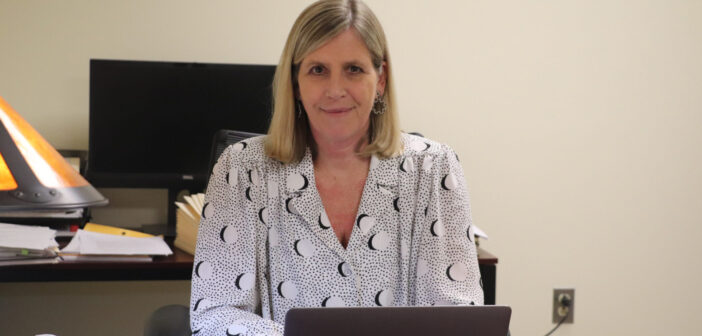Sue Troyan started her Lehigh experience as a student in Lehigh’s business college, she then provided award-winning athletic coaching. Now, she serves as the first Lehigh’s deputy director of athletics.
Troyan joined Lehigh 35 years ago with the goal of receiving her Master of Business Administration.
She worked her way up in the women’s basketball program from a graduate assistant to recruiting assistant, going on to embody head coach of Lehigh softball and assistant coach of women’s basketball in 1991.
In 1995, her husband, Fran Troyan, who previously worked as a lawyer, took the reins of the softball program so she could devote her energy solely to basketball.
Throughout her tenure as a head coach at Lehigh, she won three consecutive Patriot League titles in softball and four Patriot League titles in women’s basketball, with her last Patriot League women’s basketball title earned in 2021.
In honor of Women’s History Month, The Brown and White spoke with Sue Troyan about her career and the development of women’s sports at Lehigh.
Q: Why did you decide to take on both positions at once? Was there nobody else who could or was willing to do it?
Sue Troyan: I jumped at the opportunity because I had found a passion for coaching, teaching, mentoring, developing and ultimately leading. (This was) my first full-time opportunity here. We only had one full-time staff member in the basketball program, the head coach. At the time, the softball program was in dismal condition with a part-time head coach who hadn’t done much recruiting. (Softball) had won seven games the year prior to (me) being named head coach and had nine players in the program — you need 11 to field a team. As a favor, (Dean of Athletics and athletic director) Joe (Sterrett) asked me to take the job, recruit hard, so he had time to figure out how to handle the leadership of the program. It was his first year as athletic director, and the last thing he wanted to do was discontinue a women’s sport, so he took a chance on me in naming me head coach. At the time, I was 23 (years old), never played softball in high school or college and was named the head softball coach of a Division I program. I looked at it as an opportunity to step into a leadership role.
Q: What was it like coaching softball and women’s basketball at the same time?
ST: Those five years where I was a softball coach, assistant basketball coach (and) raising a child for the first time, there was a lot going on. I was young at the time. I would go from basketball practice to softball practice, or we’d have softball practice at six o’clock in the morning. If we had an away game for basketball, (I’d) go to the game but get home in the middle of the night and get up with softball in the morning. Now it’s a very different world. A lot has changed during this time in terms of support — and support of women’s programs in particular.
Q: What does your new position entail?
ST: I’ve been in this for nine months, so I’m still learning. We haven’t had this job within our department, and I think it speaks to Joe (Sterrett’s) emphasis on equity and having a woman in this leadership role. For me, my biggest emphasis right now is on personnel and operations. At the core, it’s supporting our coaches and our student-athletes to have a great experience and to have a competitive experience where they can put themselves in a position to compete for championships. It’s also supporting (Sterrett), so he has more time to focus on the resource development piece, as we’ve talked about how resources play an important role in our program’s success. My new position gives me the opportunity to have an impact on 25 programs and 650 student-athletes, and I really envisioned myself doing that as I finished up my career at Lehigh.
Q: From your time as a coach to now, what are the main differences or changes you’ve seen in women’s sports at Lehigh?
ST: I think support by and large. Even when you look at financial support for what we do — that encompasses staffing (and) recruiting resources; resources are critical in supporting the student-athlete experience in terms of our facilities, the competitive schedule that you play, the equipment needs of sports, the fueling needs as it pertains to nutrition and food for our athletes. Resources have also played an important role in the support of our programs: we have a strength and conditioning team, a leadership development team and a sports medicine team that all play a critical role in the development of our student-athletes and the competitive success of our programs. We didn’t have any of that when I started at Lehigh.
Q: Has there been a change in women’s sports being compared to men’s sports here?
ST: There’s a very strong priority here on equity, and that was different when I started here. Just the uniforms, practice gear, game gear, even how you traveled is very equitable in terms of the student-athlete experience (and) the expectations we’re providing student-athletes. It’s not different from being a male or a female, and I can’t say that was the case when I first started here. That’s kind of a core piece of what we do is making sure it’s an equitable experience (for) all of our student athletes across the board.
Q: Is there anything else you’d like to add?
ST: I think (Lehigh is) has taught me a lot because of the opportunities I’ve had here, and I’m grateful for that piece. I feel strongly about wanting to give back and making it a better place. I hope I can support our coaches, staff and student-athletes so they can have a distinctive experience, not only in their respective sports and in the classroom, but in terms of an experience that prepares them for a lifetime of leadership after Lehigh.






Comment policy
Comments posted to The Brown and White website are reviewed by a moderator before being approved. Incendiary speech or harassing language, including comments targeted at individuals, may be deemed unacceptable and not published. Spam and other soliciting will also be declined.
The Brown and White also reserves the right to not publish entirely anonymous comments.